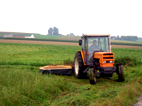
The agricultural policies of the EU have become more market oriented and agricultural
support is being provided without demands for any production. Production is determined
by consumer demand; although the objectives of the policies are still intact, they
are becoming increasingly dubious. Today, the Union consists of 27 countries with
different opinions on what needs to be prioritized.
Agriculture has a pervasive influence on land use and therefore on environmental
quality. The effects of agriculture on the environment can be positive, for example
when agriculture preserves biodiversity, or negative, when agriculture causes pollution.
Recognition of agricultures’ pervasive effects on the environment has resulted
in large amounts of tax payers’ money being channeled to the sector for environmental
protection.
AgriFood analyzes agricultural policies and related issues with the effective use
of resources as a starting point. For example, what is the efficiency of different
environmental policies related to the agricultural sector? Are there any reasons
why politics are conducted at an EU level and what are the consequences of different
reform proposals such as transfers of money from the single payment scheme to rural
development measures?
AgriFood also evaluates the consequences of events in the world at large for Swedish
agriculture. For example, is protection of the environment or animal welfare
weaker in other countries than in Sweden? Are new animal diseases being spread and
are we affected by WTO decisions?